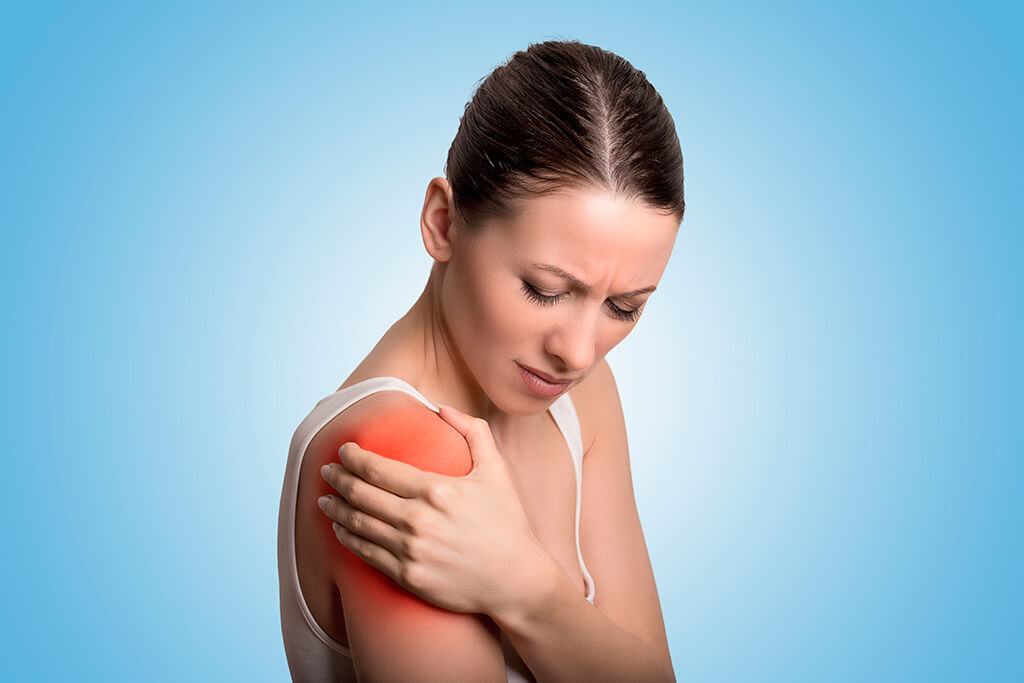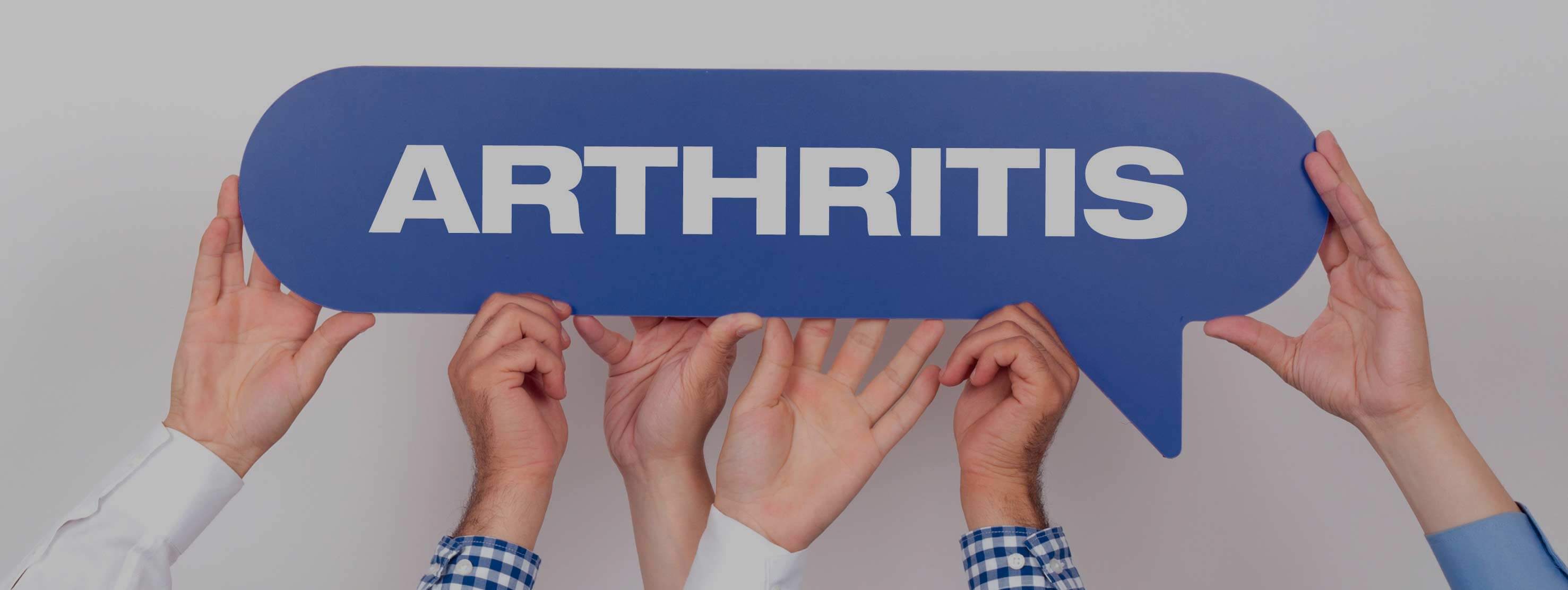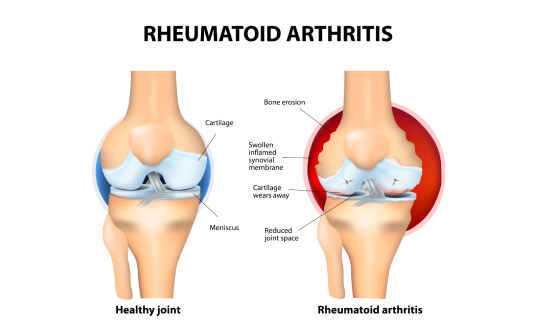Arthritis is a group of diseases of various origins, which are caused by the inflammatory lesion of the joints. There are many types of arthritis. They have different causes, but they are often similar in clinical progression and symptoms.
Causes of arthritis
The various kinds of arthritis each have its own causes. Consider the etiology of the most common joint inflammations.
Rheumatoid arthritis. This is associated with an autoimmune disorder. The causes of this condition are unknown. The viral theory is the most common cause of the disease. The role of the hereditary factor has also been proved.
Reactive arthritis. It is an autoimmune joint lesion, which develops soon after infection. The main cause is heredity in 85% of patients. The provoking factor is intestinal or urogenital (genitourinary) infections. Chlamydia is the most common pathogen of the disease as is the case with 60% of patients.
Septic arthritis. In this group of disease, the inflammatory process is caused by pathogenic microorganisms.
This includes:
- Viral arthritis – in cases of rubella, viral hepatitis, HIV, parvovirus infections
- Acute septic arthritis - can be gonococcal (develops due to gonorrhea) and non-gonococcal (major pathogens - staphylococci, streptococci, E. coli)
- Lyme disease - arthritis is caused by borrelia, the disease is transmitted through the tick bite
Psoriatic arthritis. Psoriasis affects about 2% of the world's population. 5% of people develop psoriatic arthritis. The causes of psoriasis have not yet been identified.
Ankylosing spondylitis. It is a systemic disease, which causes have not yet been identified. Men are at risk, as long as people with history of the disease and those who have intestinal infections.
Gouty arthritis. It develops due to the metabolic disorder in uric acid. As a result, joints accumulate salt deposits that cause an acute inflammatory process.
Symptoms of arthritis
The most common complaint of almost all patients with arthritis is arthralgia (joint pain). Its intensity is estimated on a scale from 1 to 4 points, as follows:
1 – minimal pain, which does not impair ability to work and does not interfere with sleep
2 – moderate pain, which can be relieved by analgesics painkillers
3 – severe and persistent pain affecting the ability to work
4 – acute pain, which is suddenly aggravated when the joint makes contact with any surfaces or objects
The following signs of inflammation are:
- Redness
- Swelling in the joint
- Limited joint mobility
It should be borne in mind that the disorder of joint mobility can be caused not only by the inflammatory process, but also by degenerative changes in the joint. In this case, mobility becomes impaired gradually over many years.
Other common symptoms of arthritis:
- Joint deformity
- Joint cracking
- Pain in the adjacent muscles
There can be general signs of inflammation, such as weakness, fatigue, fever.
Depending on how many joints are affected by the disease, there can be:
- Monoarthritis (1 joint)
- Oligoarthritis (2-3 joints)
- Polyarthritis (4 or more joints)

Peculiarities of the symptoms of certain arthritis types:
- Rheumatoid arthritis. The initial stage is characterized by a symmetrical lesion of the metacarpophalangeal joints. The pathological process eventually spreads to other joints. The disease progression is manifested by typical morning stiffness in the joints. Its duration correlates with the severity of the pathology. The condition also often affects muscles, ligaments and skin. The patient loses weight.
- Reactive arthritis. The condition can affect a different number of joints. In most cases it is polyarthritis (as is the case with 50% of patients), less often - oligoarthritis (40% of patients experience this), sometimes - monoarthritis (10% of patients are affected by this). The disease is usually accompanied with asymmetric lesion, a sudden development after the recent sexual or intestinal infection, pronounced signs of inflammation.
- Viral arthritis. There is a symmetric lesion of small joints. The condition does not become chronic and proceeds favourably.
- Acute septic arthritis. It starts suddenly and progresses rapidly. Different joints can be affected, but most commonly it affects the hip. In 85% of cases, only one joint is inflamed. Its function suddenly becomes limited. There are also pronounced symptoms of general intoxication.
- Psoriatic arthritis. This condition develops in 70% of patients due to the cutaneous manifestations of psoriasis. It is characterised by a sudden start and a pronounced joint pain, which can confine the patient to bed rest. This type of arthritis is asymmetric. The adjacent joints of the same limb are often affected.
- Ankylosing spondylitis. The condition mainly affects the spinal joints. A common symptom is bilateral inflammation of the sacroiliac joint. The patient usually has pain and stiffness in the lower back.
- Gouty arthritis. The disease progression follows a cycle. The periods of acute arthritis are replaced by interictal periods. The attacks occur suddenly and are accompanied by a very severe pain. In 50% of cases, the attack begins with the first metatarsophalangeal joint (big toe). The pathology often affects other joints, namely elbow, ankle, knee.
Diagnosis of arthritis
It is very difficult to provide a correct diagnosis for joint diseases. Indeed, an accurate diagnosis determines the choice of treatment strategy and its effectiveness. According to rough estimates, the countries with poor medical technological equipment have a 30% incidence of diagnostic errors during the determination of the inflammatory diseases of the joints.
The diagnosis starts with a clinical examination. The doctor learns patient’s anamnesis and clarifies his/her complaints. Then he examines and palpates the joints.
The following objectives symptoms are observed:
- Joint disfiguration or deformation
- Local hyperthermia
- Pain during palpation
- Accumulation of fluid in the joint cavity
- Induration or nodes
- Crunching, crepitation, crackling during auscultation
It is necessary to examine joint mobility. To this end, specialists carry out various functional tests. The amplitude of passive and active movements is determined. There is also performed the measurement of the extremity length.
Laboratory diagnosis includes:
- Clinical blood test (determines the inflammatory process)
- Urine test (determines damage to kidneys due to some rheumatic diseases)
- Biochemical blood test (assessment of the intensity of the inflammatory process, testing of kidney and liver function)
- Immunological diagnostic methods (determine immunoglobulins, rheumatoid factors, antinuclear antibodies, cryoglobulins and other substances, as well as helps to verify the diagnosis)
- Synovial fluid analysis (taken from the joint)
The instrumental diagnostic methods are also widely used for arthritis diagnosis. These include:
- Ultrasound
- MRI
- Arthrography
- Radioisotope examination of joints
- Thermal imaging diagnosis
The most informative method is arthroscopy. It involves the penetration of a miniature camera into the joint to examine its cavity. However, this is an invasive technique that can be used only on some patients.
Treatment of arthritis abroad
The treatment strategy depends on the cause of the developing arthritis. It is determined by the underlying disease and the degree of its severity. All patients receive conservative treatment.
It involves the use of different drug groups:
- NSAIDs (painkillers)
- Glucocorticoids
- Chondroprotectors
- Antibiotics
- Inhibitors of tumour necrosis factor
- Cytostatics
- Sulfonamides
- Phosphatase inhibitors
- Xanthine oxidase inhibitors
- Intra-articular injection of hyaluronic acid
Non-drug therapies:
- Physical therapy
- Spa treatment
- Massage
- Diet
- Physiotherapeutic procedures
- Extracorporeal blood purification techniques
If the inflamed joint condition deteriorates due to a long-lasting progression of a chronic disease, doctors use surgical treatment methods.
The following techniques can be used, depending on the situation:
- Arthroplasty
- Synovectomy
- Arthrodesis
- Joint endoprosthetics
The innovative methods are also used for the restoration of cartilaginous surface. To this end, the cartilages are transplanted from other parts of the body or grown from stem cells. If it is not possible for surgery to be performed due to poor health, abolition of surgical treatment; specialists can use orthopaedic devices that improve the patient’s quality of life. However, in this case, joints can continue to disintegrate with the progression of the pain.
Prognosis for arthritis
The outcome of the disease differs depending on the origin of the joint syndrome. Here is the prognosis for the main types of inflammatory joint lesion:
- Rheumatoid arthritis. The prognosis is unfavourable. It is impossible to achieve a full recovery. If the patient does not receive high quality treatment, the condition can lead to disability. The patients with rheumatoid arthritis have on average doubled cardiovascular risks, while their life span reduces by 5-10 years.
- Reactive arthritis. The prognosis is favourable. In 85% of patients, the disease can be cured within 6 months or less. 15% of patients develop a chronic form of the condition, which affects the skin, eyes and mucous membranes of different location.
- Viral arthritis. This prognosis is favourable even without the treatment. The patient experiences a spontaneous recovery within a few days or weeks.
- Acute septic non-gonococcal arthritis. The prognosis is unfavourable, especially in case of poor treatment. The overall mortality rate is 20% and in elderly patients it reaches 30%. In most cases, a surgical intervention is required. The possibility of rehabilitation depends on the quality of the performed surgery.
- Acute septic gonococcal arthritis. The prognosis is favourable. The disease can be cured quickly by antibiotics. 2% of patients develop complications (osteomyelitis, meningitis, endocarditis).
- Psoriatic arthritis. Different people have different rates of progression of the disease. Overall, the prognosis is unfavourable. Psoriasis cannot be cured completely. If arthritis developed due to psoriasis, it often progresses and ends up with a joint replacement.
- Ankylosing spondylitis. The prognosis is favourable. The disease progresses slowly, but steadily and therefore a person’s working ability is inevitably reduced.
- Gouty arthritis. The prognosis is favourable for both life and working ability. It usually takes a week for an acute attack to subside. Chronic arthritis can be managed using conservative therapy.
The high quality treatment offered at German hospitals can significantly improve the prognosis for life and working ability. The best medical centres of Europe use innovative conservative and surgical treatments that can relieve pain, restore joint mobility, as well as normalise structure and function of the joints.
How to get to Germany for treatment?
Using Booking Health’s online platform, you can choose a reputable hospital that will meet all of your needs. All the current estimated costs for treatment are also included for your perusal. The programmes include both their description and costs for diagnostic and therapeutic procedures.
If you use the reliable services of Booking Health to organise your medical travel, you will have an opportunity to:
- Save a significant amount of money by selecting a hospital and optimising the extent of therapeutic, diagnostic and rehabilitative measures.
- Receive medical insurance covering up to 200,000 euros for possible unforeseen medical expenses.
- Consult your attending physician within 3 months after the completion of the main treatment course for free.
- Solve all organisational issues (we will help you to find the hospital for the treatment, to provide good accommodation, provide an interpreter, get the necessary visa and book air tickets).
We have experience in organising treatment abroad for many years. We guarantee reliability, high standard of quality services and transparency of financial dealings. Please feel free to contact our team of advisors for help, by sending a request. We will respond with a prompt response within 24 hours of your request, with a selection of a superb hospital for you to treat your arthritis.
Choose treatment abroad and you will for sure get the best results!
Authors:
This article was edited by medical experts, board-certified doctors Dr. Nadezhda Ivanisova, and Dr. Bohdan Mykhalniuk. For the treatment of the conditions referred to in the article, you must consult a doctor; the information in the article is not intended for self-medication!
Our editorial policy, which details our commitment to accuracy and transparency, is available here. Click this link to review our policies.
Sources:
Articles for Orthopaedic Practice - Orthogate
Read:
Treatment of knee arthritis with hydrogel
Don't know where to start?
Contact Booking Health






